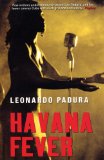Summary | Excerpt | Reviews | Beyond the Book | Readalikes | Genres & Themes | Author Bio

A side: Be gone from me
. . .In your life I'll be the best
from the mists of yesterday
when you've forgotten me,
like the best poems always
the one we can't remember.
Virgilio y Homero Expósito,
Be gone from me
The symptoms hit him suddenly, like a voracious wave sweeping
a child off a quiet shore and dragging him into the depths of the
sea: a lethal double blow to the stomach, numbness that turned his
legs to jelly, a cold sweat on his palms and, above all, the searing
pain, under his left nipple, which accompanied every single hunch
he’d ever had.
As soon as the doors to the library slid open, the smell of old
paper and hallowed places floating in that mind-blowing room
overwhelmed him. In his far-off years as a police detective, Mario
Conde had learnt to recognize the physical signs of his situation-saving
hunches: he must have been wondering if he’d ever
experienced such a powerful flood of sensations.
Initially he was all set to be ruthlessly logical, and tried to persuade
himself that it was pure chance he’d come across that shadowy,
decaying mansion in El Vedado: an unusual stroke of good fortune
for once had deigned to come his way. But a few days later, when
corpses old and new stirred in their graves, the Count began to
think that no margin for coincidence existed, that it had all been
dramatically prepared, like a stage set up for a performance that
only his disruptive entrance could trigger.
Ever since he’d left his job as a criminal investigator, more than
thirteen years ago, and devoted himself body and soul – at least as
much as his battered body and increasingly enfeebled soul allowed
– to the dicey business of buying and selling books, the Count had
developed an almost canine ability to track down prey that would
guarantee, sometimes in surprisingly generous quantities, his supply
of food and alcohol. Whether for good or for evil – he couldn’t
decide which – his departure from the police and forced entry into
the world of commerce had coincided with the official declaration
that Crisis had hit the island – a galloping Crisis that would soon
dwarf all previous versions. The perennial, interminable periods of
austerity the Count and his contemporaries had faced for decades
now started to seem, in the course of inevitable comparisons and
tricks of memory, like days of plenty or nameless mini-crises, with
no right to awe-inspiring personification by capital letter.
As if the result of a malevolent wave of a wand, the shortage of
everything imaginable quickly became a permanent state, attacking
the most disparate of human needs. The value and nature of every
object or service was artfully transmuted by insecurity into something
different from what it used to be: be it a match or an aspirin, a pair
of shoes or an avocado, sex, hopes or dreams. Meanwhile church
confessionals and consultancies of voodoo priests, spiritualists,
fortune-tellers, mediums and babalaos were crowded with new
adepts, panting after a breath of spiritual consolation.
The shortages were so acute they even hit the venerable world
of books. Within a year publishing went into freefall, and cobwebs
covered the shelves in gloomy bookshops where sales assistants had
stolen the last light bulbs with any life, that were next-to useless
anyway, in those days of endless blackouts. Hundreds of private
libraries ceased to be a source of enlightenment and bibliophilic
pride, or a cornucopia of memories of possibly happy times, and
swapped the scent of wisdom for the vulgar, acrid stench of a few
life-saving banknotes. Priceless libraries created over generations
and libraries knocked together by upstarts; libraries specializing
in the most profound, unusual themes and libraries made from
birthday presents and wedding anniversaries – were all cruelly
sacrificed by their owners on the pagan altar of financial necessity
suddenly felt by the inhabitants of a country where the shadow of
death by starvation threatened almost every home.
Excerpted from Havana Fever by Leonardo Padura Copyright © 2009 by Leonardo Padura. Excerpted by permission of Bitter Lemon Press. All rights reserved. No part of this excerpt may be reproduced or reprinted without permission in writing from the publisher
Life is the garment we continually alter, but which never seems to fit.
Click Here to find out who said this, as well as discovering other famous literary quotes!
Your guide toexceptional books
BookBrowse seeks out and recommends the best in contemporary fiction and nonfiction—books that not only engage and entertain but also deepen our understanding of ourselves and the world around us.